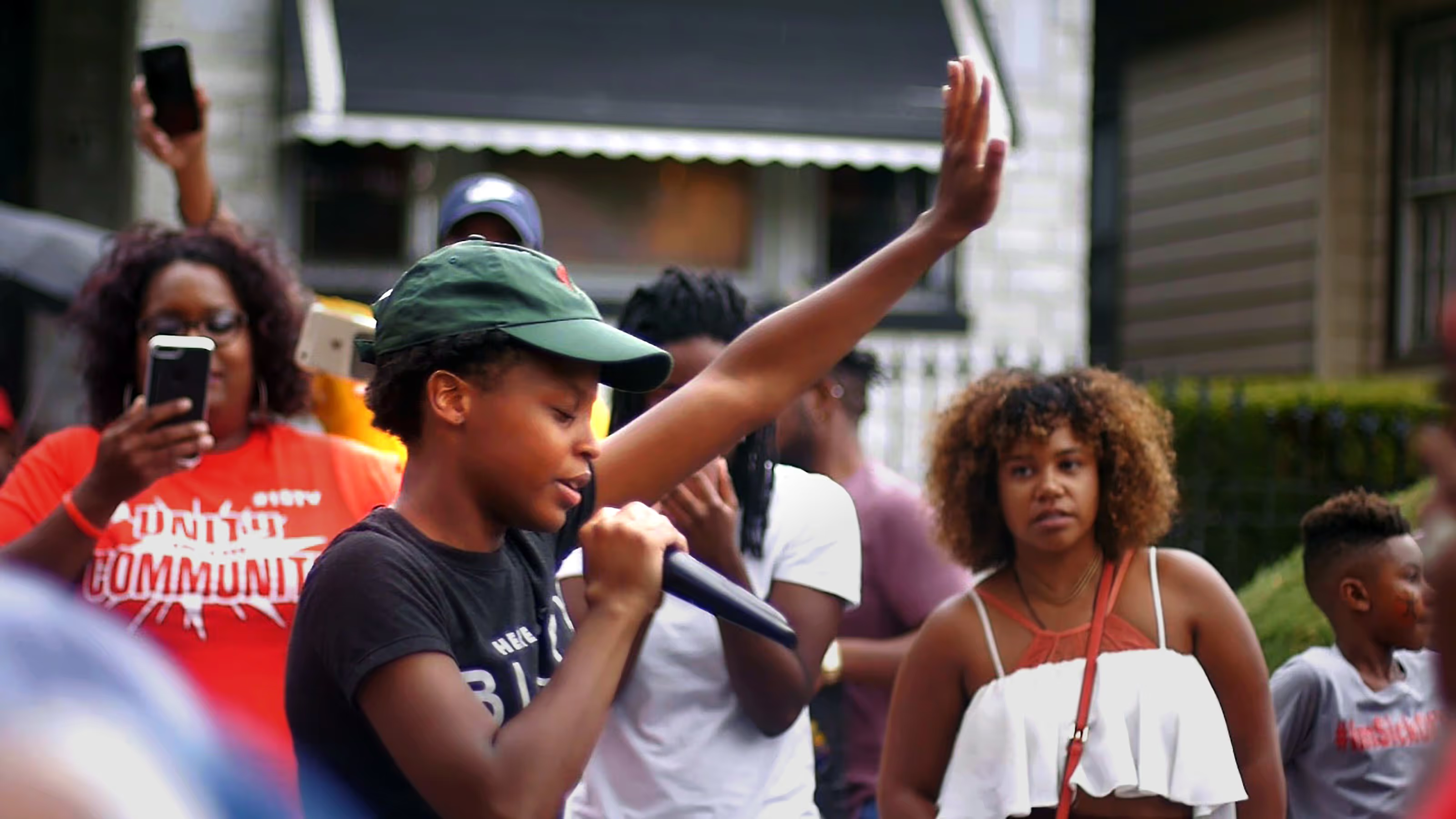Unapologetic Discussion Guide The Film: Participants and Key Issues
The Film: Participants and Key Issues

Synopsis & Participants
Unapologetic captures a tense and polarizing moment in Chicago’s fight for the livelihood of its Black residents. The film follows Janaé Bonsu and Bella Bahhs, two young abolitionist organizers, as they work within Chicago’s Movement for Black Lives to seek justice for Rekia Boyd and Laquan McDonald, two young Black people killed by Chicago police. They work toward two major aims: radical transformation of the criminal legal system, and to elevate leadership by women and femmes.
Janaé Bonsu, 24 (at the start of filming), moves to Chicago committed to pursuing her PhD in social work. She is a community organizer and PhD candidate in social work whose activism and scholarship centers Black women, trans, and gender nonconforming people’s experiences of interpersonal and state-sanctioned violence and safety. She joins the Chicago chapter of Black Youth Project 100 (BYP100), a young activist organization committed to progressive change in Black communities through policy and direct action. Janaé ventures beyond the ivory towers of her university and becomes knee-deep in the movement, eventually rising through the ranks to national policy chair and, later, national co-director. However, her enthusiasm for organizing wanes as challenges and controversy strike the organization, forcing her to grapple with the physical and mental toll of leadership. With her academics faltering, she questions whether she has the stamina to achieve her personal goals in the midst of challenging state and intra-community violence.
Ambrell “Bella BAHHS” Gambrell, 22 (at the start of filming), is a“rap-tivist” from the West Side of Chicago whose artistry and activism seek to heal women harmed by the intergenerational effects of incarceration. As a Chicago native, she is thrust to the forefront of the movement after a video of her protest leadership goes viral. The video changes her presence both within and outside her Chicago community. Internally, however, Bella grapples with the recent death of her grandmother, who was her primary caretaker while her parents were incarcerated. Only after Bella attends a picnic for a historic local gang do we uncover her grandmother's roots as a respected gang leader. But "gang" means something different to Bella; to her, gang members were community leaders who gave kids school supplies and made sure the block was fed. So, when Bella powerfully leads a chant )Protect and serve, we are the police! We're taking back our community!), the words are inspired by the grassroots leadership of the street warriors who raised her.
Throughout the film, we see how movement actions play out in the landscape of Chicago's city politics. After a slew of protests in response to the murder of Laquan McDonald and the ensuing coverup, mayor Rahm Emanuel fires police superintendent Garry McCarthy. While this seems like a win for the organizing community, the subjects of the film continue fighting deep, personal battles. After failing an assignment and risking her doctoral career, Janaé realizes the ways in which organizing can cause her to overextend herself. For Bella, the stakes are even higher. Her brother is sentenced to fifty years in prison, leaving her to balance her true purpose in movement work while her family struggles to survive within the criminal legal system. Furthermore, discord within the organizing community spurs Janaé and Bella to reconsider the impact of their multi-year efforts. They find themselves unable to separate the movement from their personal lives and begin to ask, in a Trump-era America, what does a sustainable lifestyle look like for both their community and their own wellbeing?
After winning a Soros Justice Fellowship to pursue work in criminal justice reform, Bella makes the courageous decision to create the Sister Survivor Network, an organization that aims to help heal women impacted by America's prison system. Janaé overcomes the challenges of balancing organizing work and her PhD program by being elevated to the national co-director of BYP100 and officially becoming a PhD candidate; in an emotional scene, she triumphantly defends her dissertation proposal. Both subjects push through various trials and triumphs alike in their full personhood—saying what needs to be said and doing what needs to be done—without apology.
Key Issues
Unapologetic is an excellent tool for outreach and will be of special interest to people who want to explore the following topics:
- Activism
- Familial incarceration
- Gender-based violence
- Police/state violence
- Police accountability
- Prison industrial complex abolition
- Queerness
